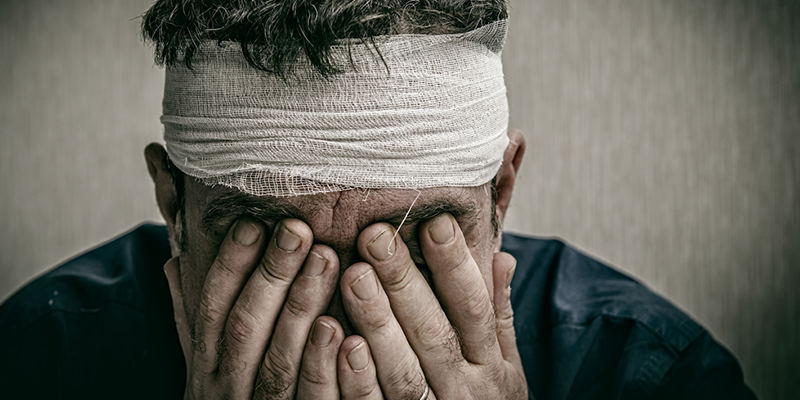
Content updated from previous publish date.
Popular sports figure, TV commentator, and all-around beloved public personality, Terry Bradshaw spoke somberly and candidly about the toll his many football-related concussions have taken on his brain health and talked about his time at Amen Clinics. Bradshaw is one of nearly 200 football players from 27 teams and all positions who have undergone brain SPECT imaging at Amen Clinics to investigate the association between playing football, brain damage, and cognitive and mental health issues.
Terry Bradshaw is one of nearly 200 football players who have undergone brain SPECT imaging at Amen Clinics to investigate the association between playing football, brain damage, and cognitive and mental health issues. Click To TweetHOW HEAD TRAUMA AFFECTS MEMORY AND MORE
The brain-imaging work at Amen Clinics shows that traumatic brain injuries—even mild head injuries that aren’t diagnosed as a concussion or that don’t cause a loss of consciousness—are a major cause of psychiatric illnesses, cognitive issues, and memory problems. However, few people know this because the field of psychiatry virtually never looks at the organ it treats—the brain.
Four-time Super Bowl-winning quarterback, Terry Bradshaw, says he sustained more than six concussions over his lengthy NFL career. He has spoken openly about problems with his short-term memory, as well as his hand-eye coordination, and depression—all symptoms that are commonly seen in people with sports-related and everyday brain injuries.
One of the many brain-imaging studies Amen Clinics has conducted on football players was published in the Journal of Neuropsychiatry and Clinical Neurosciences. For this study, evaluations included detailed histories, cognitive testing, brain SPECT imaging, and qEEG studies on each of the players. The results were very clear: Playing football damaged multiple areas of the brain in greater than 90% of the players. In particular, there was persistent damage to the following areas of the brain:
- Prefrontal cortex (judgment, planning, forethought, and impulse control)
- Temporal lobes (learning, memory, and mood stability)
- Cerebellum (mental agility and processing speed)
CAN FORMER FOOTBALL PLAYERS IMPROVE BRAIN HEALTH?
You may have heard of “boxing dementia.” Now we are looking at “gridiron dementia.” The good news is that with a brain-health program, it is possible to repair, rehab, and reverse some of the brain damage that occurs in head injuries.
For another study that appeared in the Journal of Psychoactive Drugs, 80% of former football players who followed a brain-health program at Amen Clinics showed significant improvement in blood flow to the prefrontal cortex, as well as improvements in overall cognitive functioning, processing speed, attention, reasoning, and memory.
5 WAYS TO REHAB THE BRAIN AFTER HEAD INJURY
Whether or not you are a former football player, here are five things you can do to help nourish and care for your brain today if you have experienced a head injury:
1. Take brain-smart supplements.
Nutraceuticals that are especially good for improving any brain, but particularly for damaged or aging brains include:
- A multivitamin
Our food supply has been processed to the point where we have removed many of the nutrients. Plus, 91% of Americans do not eat five servings of fruits and vegetables a day—the minimum required to get the nutrition that you need. Everyone should take a multivitamin. - Omega-3 fatty acids
Omega-3 fatty acids are critical to building healthy cell membranes, which are crucial for all our cells to work and essential for our brain cells to make the trillions of connections that enable peak cognitive, mood, and behavioral performance. Low omega-3 fatty acids are associated with heart disease, cancer, skin problems, diabetes, obesity, depression, and dementia. - Vitamin D
Vitamin D used to be considered just a bone vitamin, but intensive research established that the body converts it into a hormone that also helps regulate brain, cardiovascular, immune, muscle, lung, joint, and kidney functions. Vitamin D is important for the brain’s early development and ongoing renewal, and in clinical trials, it promotes healthy mood management and cognitive functions. - A combination of brain-directed supplements
Ginkgo biloba (supports healthy blood flow), acetyl-l-carnitine (supports mitochondrial energy), huperzine A (supports acetylcholine), N-acetyl-cysteine and alpha-lipoic acid (antioxidant support), and phosphatidylserine (for nerve cell membrane support) are all critical for optimal brain function.
In the NFL study, the players used all these supplements to support overall brain health, circulation, memory, and concentration.
2. Check your HbA1C and fasting blood sugar levels.
High blood sugar levels impair healing. In a study from UCLA, mice that were given sugar after a head injury had delayed healing. Skip the Gatorade and rehydrate with water or opt for a sugar-free beverage that delivers essential electrolytes.
3. Check your thyroid, DHEA, and testosterone levels.
Because of its location within the skull, the pituitary gland (the master hormone gland) is often damaged in head injuries. Testing and optimizing hormonal imbalances is a critical part of the healing process after a concussion or TBI.
4. Try hyperbaric oxygen therapy.
HBOT is a non-invasive therapy that uses the power of oxygen to accelerate the healing process. A study in Plos One showed that HBOT improves post-concussion syndrome.
5. Protect your head.
One of the best things you can do is avoid future head injuries. Always wear your seatbelt, wear a helmet when riding a bike or skiing, hold the handrail when going down stairs, and avoid playing contact sports.
The most important thing our brain-imaging research on football players reveals is that even if you have been bad to your brain and have injured it, you can change your brain to make it better. And with a better brain comes a better life, better moods, and a better memory.
Head injuries and the mental health, cognitive, and memory issues associated with them can’t wait. At Amen Clinics, we’re here for you. We offer in-clinic brain scanning and appointments, as well as mental telehealth, clinical evaluations, and therapy for adults, teens, children, and couples. Find out more by speaking to a specialist today at 888-288-9834 or visit our contact page here.





I am recently retired from 42 years as a Speech Pathologist for the VA System, Chicago. I worked with concussion patients from Afghanistan and Iraq, during the last few years of my career. I continue to work contract and find interesting, any new information on concussion treatment. Thank you,
Sincerely,
Pamela Hrabak
Comment by Pamela Hrabak — December 31, 2017 @ 2:54 PM
The incidence of athletes who play on grass with vector borne infections is being totally overlooked. Poor testing doesn’t mean you just ignore a root cause of brain vulnerability!
Comment by Angela Berry — February 1, 2023 @ 2:02 PM
Thank. you so much for this information. My husband recently (Sept. 2022) had a skateboarding accident and a severe head injury. He is progressing well with ups and downs with many of the symptoms you described here especially depression along with judgment, planning, forethought, and impulse control newer learning, memory, and mood stability. I have been following you and am excited to show this information to my husband. He is a middle school math teacher and coach and is hoping to get back to work. We are hopeful. Do you recommend specific brand of multi vit fish oil and other supplements. Thank you again!!
Comment by Beth DelSignore — February 7, 2023 @ 4:15 AM
Hello Beth, thank you for reaching out. For more information about Dr. Daniel Amen's recommended, brain-directed supplements visit https://brainmd.com/.
Comment by Amen Clinics — February 7, 2023 @ 7:56 AM
The HBOT chamber works best at 2.2 atmospheres (magic), and 3.0 atmospheres (Heaven).
Comment by Councill Rudolph, MD — April 18, 2023 @ 10:39 AM
Will the HBOT Chamber treatment help EARLY DIMENTIA?
Comment by william meiser — November 19, 2023 @ 9:55 AM